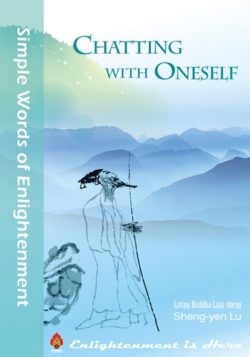‧Written by Sheng-yen Lu‧
A US Daden Culture Publication
I have made small comparisons between China’s Confucianism, Taoism, and Buddhism. These are not academic comparisons, rather general and brief explanatory comments.
 Confucianism –
Confucianism –
Benevolence, Righteousness, Etiquette, Wisdom, and Faith.
Loyalty, Forgiveness, Integrity, Brightness, and Ethic.
Committing no transgressions.
These are principles of appropriate human conduct advocated by Confucius. He discouraged talk about strange happenings, superstitions, and gods.
Taoism –
Essence, Vital Breath, Spirit (Jing, Qi, Shen).
Searching for the elixir of immortality.
Liberation from the corpse.
Becoming immortal.
Taoist spiritual master Lu Chunyang is an example of one who cultivated the immortality practice to become a celestial being.
Buddhism –
Hinayana Buddhism emphasizes attaining self-liberation through one’s own efforts.
Mahayana Buddhism emphasizes the practice of bodhicitta.
Nirvana.
Understand the mind and see the Buddha-essence (mingxin jianxing).
The Buddhas’ Pure Lands.
(Shakyamuni Buddha, for example, attained the prajna wisdom of Buddhahood.)
Sutrayana schools practice precepts, stability, and wisdom.
Tantrayana schools practice wind, channels, and drops.
But, it should be noted in particular that here is a “rule of heavens”:
Confucius is dead! Laozi is dead!
Shakyamuni Buddha is dead!
The sage, the immortal, and the fully enlightened one, they similarly grew old and died under this rule of heavens.
Even the founders of the largest religions could not escape this fate.
Shakyamuni Buddha is dead!
Jesus is dead!
Mohammed is dead!
All great spiritual practitioners, adepts, lineage masters, they all died!
This reflects the principle that all tangibles will vanish and return to the illusory.
“To transcend birth and death” was my original intention when choosing to study Buddhism.
After enlightenment and realization of the mind, I knew there is “no birth and death to transcend” and “no birth and death to throw out.”
I realized there is “neither birth nor death,” “neither arising nor extinguishing,” and “neither coming nor going.”
I knew then the last words of Master Sheng Yen, “Both birth and death can be thrown out,” were a big joke.
Knowing everyone will die, makes me so happy that I could die!
Knowing all great adepts will die, tickles me to death with joy!
Knowing I will also die, I rejoice!
“Death” is simply a rule of heavens. The moment one accepts death, one arrives at great discernment and understanding.
“What do you know about birth and death?”
My reply:
“I know there is no birth or death!”
“To most, life is existence, and death is non-existence. How do you see between existence and emptiness? Apart from form is emptiness and emptiness is form, what view can you offer?”
“Just be natural (ziran).”
“What does that mean to be natural?”
“Do as one wishes without creating transgressions!”
“Is this the attitude of an enlightened person?”
My reply:
“I know and understand we are simply laboring in dreams! Ha ha!”
Leave a Reply